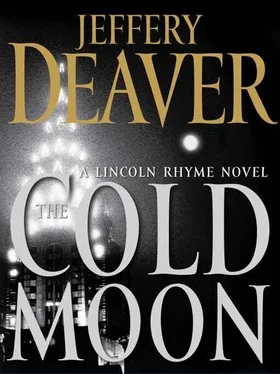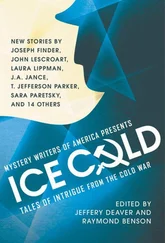"I was in the office and he'd gone to the mess hall. I was going to pick him up at thirteen hundred hours and we were going to drive to the bone lot. I went to get him in a Humvee. I saw Petey there, waiting for me. Just then an IED went off. That's a bomb."
Dance knew this, of course.
"I was about thirty, forty feet away when it blew. Petey was waving and then there was this flash and the whole scene changed. It was like you blinked and the square became a different place." She looked out the window. "The front of the mess hall was gone, palm trees-they just vanished. Some soldiers and a couple of civilians who'd been standing there…One instant there, then they were gone."
Her voice was eerily calm. Dance recognized the tone; she heard it often in witnesses who'd lost loved ones in crimes. (The hardest interviews to do, worse than sitting across from the most amoral killer.)
"Petey's body was shattered. That's the only way to describe it." Her voice caught. "He was all red and black, broken… I've seen a lot over there. But this was so terrible." She sipped the water and then clutched the bottle like a child with a doll.
Dance offered no words of sympathy-they'd be useless. She nodded for the woman to continue. A deep breath. Lucy's fingers intertwined tightly. In her work, Dance characterized this gesture-a common one-of trying to strangle the unbearable tension arising from guilt or pain or shame.
"The thing is…I was late. I was in the office. I looked up at the clock. It was about twelve fifty-five but I had a half cup of soda left. I thought about throwing it out and leaving-it'd take five minutes to get to the mess hall-but I wanted to finish the soda. I just wanted to sit and finish it. I was late getting to the mess hall. If I'd been on time he wouldn't've died. I would've picked him up and we'd have been a half mile away when the IED blew."
"Were you injured?"
"A little." She pulled up her sleeve and displayed a large leathery scar on her forearm. "Nothing serious." She stared at the scar and then drank more water. Her eyes were hollow. "Even if I'd been just one minute late at least he'd've been in the vehicle. He probably would have survived. Sixty seconds…That would've made the difference between him living and dying. And all because of a soda. All I wanted was to finish my goddamn soda." A sad laugh escaped her dry lips. "And then who shows up and tries to kill me? Somebody calling himself the Watchmaker, leaving a big-ass clock in my bathroom. For weeks all I can think about is how a single minute, one way or the other, makes the difference between life and death. And here's this freak throwing it in my face."
Dance asked, "What else? There's something more, isn't there?"
A faint laugh. "Yep, here's the problem. See, my tour was scheduled to be up next month. But I felt so guilty about Pete that I told my CO I'd reenlist."
Dance was nodding.
"That's what this ceremony's about. It's not about getting wounded. We're wounded every day. It's about reenlisting. The army's having a tough time getting new recruits. They're going to use the reenlisters as poster children for the new army. We like it so much we want to go back. That sort of thing."
"And you're having second thoughts?"
She nodded. "It's driving me crazy. I can't sleep. I can't make love to my husband. I can't do anything… I'm lonely, I'm afraid. I miss my family. But I also know we're doing something important over there, something good for a lot of people. I can't decide. I simply can't decide."
"What would happen if you told them you changed your mind?"
"I don't know. They'd be pissed probably. But we're not talking court-martial. It's more my problem. I'd be disappointing people. I'd be backing down from something. Which I've never done in my life. I'd be breaking a promise."
Dance thought for a moment, sipping the water. "I can't tell you what to do. But I will say one thing: My job is finding the truth. Most everybody I deal with are perps-criminals. They know the truth and they're lying to save their butts. But there're also a lot of people I come across who lie to themselves. And usually they don't even know it.
"But whether you're deceptive to the cops or your mother or husband or friends or yourself, the symptoms're always the same. You're stressed, angry, depressed. Lies turn people ugly. The truth does the opposite… Of course, sometimes it seems like the truth is the last thing we want. But I can't tell you how many times I've gotten a suspect to confess and he gives me this look, it's like pure relief in his face. The weirdest thing: Sometimes they even say thanks."
"You're saying I know the truth?"
"Oh, yeah. You do. It's there. Covered up real good. And you might not like it when you find it. But it's there."
"How do I find it? Interrogate myself?"
"You know, that's a great way to put it. Sure, what you do is look for the same things I look for: anger, depression, denial, excuses, rationalization. When do you feel that way and why? What's behind this feeling or that one? And don't let yourself get away with anything. Keep at it. You'll find out what you really want."
Lucy Richter leaned forward and hugged Dance-something very few subjects ever did.
The soldier smiled. "Hey, got an idea. Let's write a self-help book. The Girl's Guide to Self-Interrogation. It'll be a best seller."
"In all our free time." Dance laughed.
They tapped the water bottles together with a ring.
Fifteen minutes later they were halfway through the blueberry muffins and coffee that they'd ordered from room service when the agent's mobile phone chirped. She looked at the number on caller ID. Kathryn Dance shook her head and gave a laugh.
The doorbell of Rhyme's town house rang. Thom arrived in the lab a moment later, accompanying Kathryn Dance. Her hair was loose, not in the taut braid of earlier, and the iPod headsets dangled around her neck. She took off a thin overcoat and greeted Sachs and Mel Cooper, who'd just arrived.
Dance bent down and petted Jackson, the dog.
Thom said, "Hmm, how'd you like a going-away present?" Nodding at the Havanese.
She laughed. "He's adorable but I'm about at my livestock limit at home-both the two- and four-legged variety."
It had been Rhyme on the phone, asking her, please, could she help them out once more?
"I promise it's the last time," he now said as she sat beside him.
She asked, "So what's up?"
"There's a glitch in the case. And I need your help."
"What can I do?"
"I remember you told me about the Hanson case in California-looking over the transcript of his statement gave you some insights into what he was up to."
She nodded.
"I'd like you to do the same thing for us."
Rhyme now explained to her about the murder of Gerald Duncan's friend, Andrew Culbert, which set Duncan on the path of bringing down Baker and Wallace.
"But we found some curious things in the file. Culbert had a PDA but no cell phone. That was odd. Everybody in business nowadays has a cell phone. And he had a pad of paper with two notes on it. One was 'Chardonnay.' Which might mean that he'd written it to remind himself to buy some wine. But the other was 'Men's room.' Why would somebody write that? I thought about it for a bit and it occurred to me that it was the sort of thing that somebody'd write if they had a speech or hearing problem. Ordering wine in a restaurant, then asking where the rest rooms were. And no cell phone, either. I wondered if maybe he was deaf."
"So," Dance said, "Duncan's friend was killed because the mugger lost his temper when the victim couldn't understand him or didn't hand over the wallet fast enough. He thought that Baker killed his friend but it was just a coincidence."
Читать дальше












